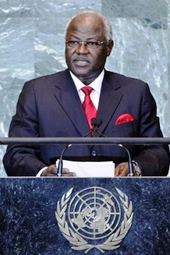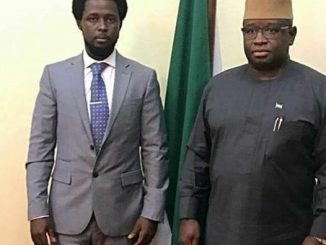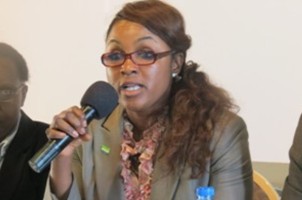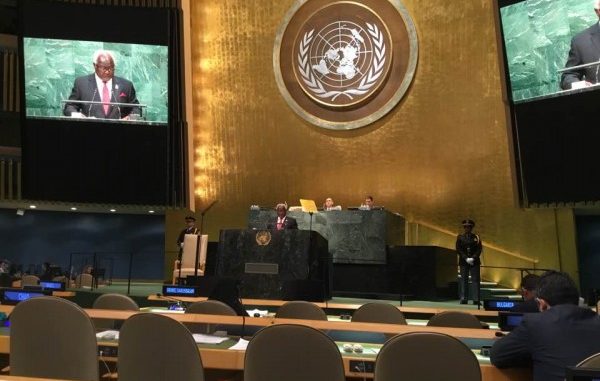
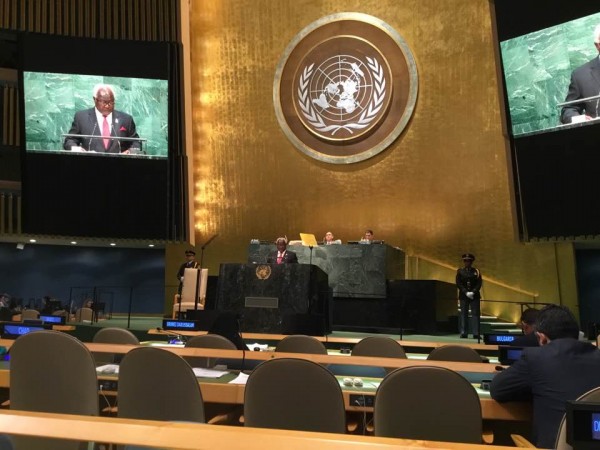 PRESIDENT KOROMA yesterday told the 71st Session of the UN General Assembly that his Government remains committed to good governance, and will continue to build upon the country’s post-conflict peacebuilding and democratic gains by further strengthening her democratic institutions and by strengthening access to justice.
PRESIDENT KOROMA yesterday told the 71st Session of the UN General Assembly that his Government remains committed to good governance, and will continue to build upon the country’s post-conflict peacebuilding and democratic gains by further strengthening her democratic institutions and by strengthening access to justice.
HERE IS THE STATEMENT IN FULL :
Statement delivered by His Excellency Dr Ernest Bai Koroma, President of the Republic of Sierra Leone at the 71st Session of the United Nations General Assembly in New York, 22nd September 2016
Mr. President,
Mr. Secretary General,
Colleague Heads of State and Government,
Distinguished Ladies and Gentlemen,
I congratulate you, Mr. President, on your election and I commend your predecessor, His Excellency Mr. Mogens Lykketoft, for his effective leadership of the previous session. Let me also, on behalf of the Government and people of Sierra Leone, applaud His Excellency Mr. Ban Ki-moon for his dedication and commitment to the advancement of global peace and development during his ten years of service to our organization. I commend you, Mr Secretary General for your vision and initiatives including the major High-Level Panel Reviews, the historic adoption of the Sustainable Development Goals (SDGs), the signing of the Paris Agreement and the convening of the first World Humanitarian Summit. We in Sierra Leone will also always remember you with deep appreciation for your exemplary role in mobilizing support for our successful fight against the deadly Ebola disease.
Mr. President,
You could not have been more thoughtful with the theme for our debate this year. To “Transform our World” we must universally push forward “The Sustainable Development Goals”. To save the millions of women and children still trapped in poverty, to bring peace to troubled regions, to prevent and to contain disease outbreaks, we must push forward with energy, with compassion and with resolve.
In Sierra Leone, drawing from the lessons learnt from the implementation of the MDGs, we have taken action to quickly integrate the SDGs into our national development planning processes by linking each of the 17 goals and 169 targets to our national development programme- the Agenda for Prosperity. Sierra Leone was one of the twenty-two countries that were reviewed during the ECOSOC High-Level Political Forum (HLPF) in July this year. We shared our perspective on how we want to implement the SDGs, the challenges we envisage and how we hope to overcome them.
At the same time, we have formulated a National Integrated Results Framework aligning the SDGs to our A4P monitoring and evaluation mechanism. We have also established the Sierra Leone International Benchmarks System to address the challenges relating to reliable statistical data required to report on our progress.
But Mr. President, whatever we do at the national level, whatever efforts we make at the global stage, whatever projects the brightest amongst us design, we will not be able to deliver on the SDG’s promise of an inclusive, fairer and better world without the reform of the United Nations. Let me put it straight: our premier global institution lacks the democratic competencies to tackle the developmental, security and other challenges facing Africa and many other parts of the world. Without strong African voices at the highest level of our premier global decision making body; without the energetic voices of the region with the largest number of young people, without the decisive contribution of the continent that is mostly affected by Security Council decisions, no solution proffered to our challenges by the United Nations would be sustainable, inclusive or lasting.
Yes, Africa’s position is about righting historic wrongs. Yes, Africa’s position is about enhancing African voices at the United Nations. But more than everything, Africa’s position is our contribution to making the United Nations more effective, more democratic and more forward – looking
That is why we believe that diluting any of the key elements of our position is akin to the continuation of a status quo that is unfair, unjust, non-inclusive and unfit for the better purposes of the twenty first century.
Africa has asked me, as Coordinator of its Committee of Ten on the Reform of the United Nations, to tell the world that we will stand united behind the Ezulwini Consensus and Sirte Declaration. We have reaffirmed the African position at the African Union Summit in Kigali in July and we deeply frown at attempts to take down our common position through divide and rule policies reminiscent of the colonial era.
Mr. President,
In September last year, at the Leaders’ Summit on Peacekeeping, we committed ourselves to enlarging and modernizing UN peacekeeping operations. At that Summit, I made a pledge to contribute to the UN Peacekeeping with commitments to provide two Formed Police Units (FUPs), Special Weapon and Tactics (SWAT) Units; and Police Guards to the UN Standby Arrangement System (UNSAS). We are now very ready to deploy at short notice.
Mr. President,
Sierra Leone welcomes the report of the Secretary-General and his Agenda for Humanity. The World Humanitarian Summit held this year was a turning point, where we collectively pledged to improve our response to people caught up in natural disasters and conflicts; to empower them as agents of their recovery; and to summon greater political will to prevent and end the wars that are causing so much suffering. Millions of people need humanitarian help and millions more have been forcibly displaced from their homes. We must set the right tone to address the lingering challenges facing our world. My delegation endorses the adoption of the Political Declaration on the “Large Movements of Refugees and Migrants” and fully subscribes to the call to address the root causes, including efforts aimed at early prevention of crisis situations.
Sierra Leone also welcomes the unanimous adoption in April this year of Security Council resolution 2282 and General Assembly resolution 70/262. These parallel resolutions demonstrate our commitment towards a comprehensive approach to transitional justice and an accountable security sector, which are critical to consolidating peace, reducing poverty and preventing countries from relapsing into conflict.
In Sierra Leone, our commitment to continue addressing key underlying causes of fragility and drivers of conflict is underlined by our participation as a pilot country to the New Deal for Engagement in Fragile States. And being the current Chair of the g7+ Group of Fragile States, Sierra Leone pays great attention to incorporating SDG 16. We also recognize that the effective management of the country’s natural resources is central to ensuring sustainable socio-economic development and a resilient future for Sierra Leoneans.
My Government remains committed to good governance, and will continue to build upon our post-conflict peacebuilding and democratic gains by further strengthening our democratic institutions; by strengthening access to justice. This is why we have taken steps to improve on the conditions of service in our justice sector, to attract and deploy more qualified personnel to the bench and as state counsels in every region and every district throughout Sierra Leone. We established the Legal Aid Board to ensure that indignant persons have legal representation; that there is no one in our correctional centers without an indictment; that cases are speedily heard and that justice is fairly served. Those strides are significant in our journey to attaining a resilient and inclusive Sierra Leone; they remain the bedrock of our aspiration to becoming a middle-income country by 2035.
Mr. President,
This is why we have hastened to put in place major relevant policy decisions and enacted appropriate legislations to empower women, improve the situation of youth and ensure that the physically challenged are not marginalized. My Government’s vision for the empowerment of women as enshrined in Pillar 8 of our A4P is consistent with global aspirations, in recognition of the crucial importance of women and gender parity in our development process. Most of my Government’s programmes are youth oriented ranging from education to health, community development, and employment. Efforts in addressing youth empowerment and unemployment remain at the heart of our A4P. My Government has also made a record number of appointments of youths and women into top-level decision-making positions, including ministerial, ambassadorial and leadership posts in Government Departments and Agencies and in the Military, Police, Parliament, judiciary and Local Government Administration.
Mr. President,
The Ebola outbreak in West Africa had put a spotlight on the critical need for the world to have a more robust and effective global health architecture with strong and accountable leadership to deal with health crises, including pandemics. In this context, my delegation commends the High-Level Panel Review on the Global Response to Health Crises for its comprehensive report. We strongly consider its 27 recommendations as the way forward for appropriate action at national, regional and international levels. We must collectively commit ourselves to the full implementation of the Panel’s recommendations in order to protect humanity from the scourges of future health crises.
On behalf of the Government and people of Sierra Leone, Let me express our appreciation to the international community for supporting us to defeat the Ebola virus. We are now implementing our Post Ebola Recovery Programme. We applaud the support we have received, but we still face enormous resource gaps. I would therefore like to remind our bilateral friends and the international community to fulfill their pledges to our recovery programme.
Mr. President,
Though we contribute almost nothing to global warming, Sierra Leone is the third most vulnerable country to the effects of climate change. Dealing with climate change is therefore an urgent life and death matter for us. That is why we welcome the Paris Agreement. We will implement its provisions in Sierra Leone. My Government, in collaboration with our development partners, is implementing projects on adaptation, including climate information and early warning systems. We remain committed to these efforts and we seek further collaboration in confronting this global threat against humanity.
Mr. President,
As we move into the implementation of the first phase of the SDGs, we must remember that fragile states were unable to make remarkable progress in the implementation of the MDGs largely owing to the absence of peace, justice and effective state institutions. It is therefore urgent for all parties to cooperate with global initiatives in finding enduring peace in Syria, South Sudan and Libya. This is why the world must accelerate its efforts in resolving the Israel Palestine conflict, in fighting terrorism, and in stemming the dangerous escalations in the arms race.
We cannot sustain this world with bombs and the unending threat of war. We cannot achieve a universal push to development when armed conflicts continue to drive millions into refugee camps, when millions find themselves trapped between warring factions. We cannot champion the course of justice and legitimacy when Africa remains excluded and underrepresented in the highest decision – making organs of our global organisation. The reforms must start here and they must with deliberate and enduring.
Mr. President,
While we acknowledge the gradual progress made so far, particularly in the transparent process of selecting and appointing the next Secretary-General, let me again reiterate that the member states of Africa are unhappy about the slow pace of the Security Council reform. Concluding, let me once again re-echo Africa’s strong concern over the continuous failure of the UN to adopt measures, including text based negotiations that will lead to a comprehensive and early reform of the Security Council to reflect contemporary realities. I would therefore like to urge that the reform process move faster so that Africa can take its rightful place in the UN Security Council. The UN must move with the times and must do so by effecting the relevant reforms. Redressing the much acknowledged historical injustice done to the continent will be a remarkable step in our ‘Universal Push in Transforming our World. We cannot effectively deal with the evolving challenges of our time if we continue to hold on the edicts and structures established seventy-one years ago. The equitable geographical representation, with the attendant privileges in the membership of the Council would only make it more legitimate, representative, effective, transparent and accountable.
I thank you for your attention.

